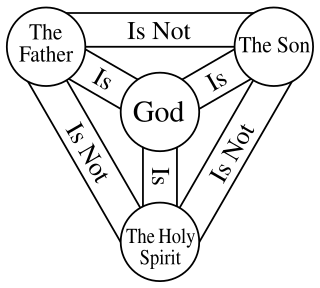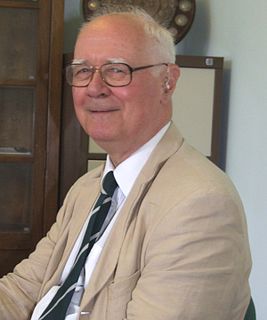
Creationism is the religious belief that nature, and aspects such as the universe, Earth, life, and humans, originated with supernatural acts of divine creation. In its broadest sense, creationism includes a continuum of religious views, which vary in their acceptance or rejection of scientific explanations such as evolution that describe the origin and development of natural phenomena.

The Christian doctrine of the Trinity defines one God existing in three coequal, coeternal, consubstantial divine persons: God the Father, God the Son and God the Holy Spirit, three distinct persons sharing one homoousion (essence). In this context, the three persons define who God is, while the one essence defines what God is.
The teleological argument is an argument for the existence of God or, more generally, that complex functionality in the natural world which looks designed is evidence of an intelligent creator.

John Charlton Polkinghorne was an English theoretical physicist, theologian, and Anglican priest. A prominent and leading voice explaining the relationship between science and religion, he was professor of mathematical physics at the University of Cambridge from 1968 to 1979, when he resigned his chair to study for the priesthood, becoming an ordained Anglican priest in 1982. He served as the president of Queens' College, Cambridge, from 1988 until 1996.

Young Earth creationism (YEC) is a form of creationism which holds as a central tenet that the Earth and its lifeforms were created in their present forms by supernatural acts of the Abrahamic God between approximately 6,000 and 10,000 years ago. In its most widespread version, YEC is based on the religious belief in the inerrancy of certain literal interpretations of the Book of Genesis. Its primary adherents are Christians and Jews who believe that God created the Earth in six literal days, in contrast with old Earth creationism (OEC), which holds literal interpretations of Genesis that are compatible with the scientifically determined ages of the Earth and universe and theistic evolution, which posits that the scientific principles of evolution, the Big Bang, abiogenesis, solar nebular theory, age of the universe, and age of Earth are compatible with a metaphorical interpretation of Genesis.

Old Earth creationism (OEC) is an umbrella of views encompassing certain varieties of creationism which may or can include day-age creationism, gap creationism, progressive creationism, and sometimes theistic evolutionism.

Theistic evolution is a theological view that God creates through laws of nature. Its religious teachings are fully compatible with the findings of modern science, including biological evolution. Theistic evolution is not in itself a scientific theory, but includes a range of views about how science relates to religious beliefs and the extent to which God intervenes. It rejects creationist doctrines of special creation, but can include beliefs such as creation of the human soul. Modern theistic evolution accepts the general scientific consensus on the age of the Earth, the age of the universe, the Big Bang, the origin of the Solar System, the origin of life, and evolution.

The history of creationism relates to the history of thought based on the premise that the natural universe had a beginning, and came into being supernaturally. The term creationism in its broad sense covers a wide range of views and interpretations, and was not in common use before the late 19th century. Throughout recorded history, many people have viewed the universe as a created entity. Many ancient historical accounts from around the world refer to or imply a creation of the earth and universe. Although specific historical understandings of creationism have used varying degrees of empirical, spiritual and/or philosophical investigations, they are all based on the view that the universe was created. The Genesis creation narrative has provided a basic framework for Jewish and Christian epistemological understandings of how the universe came into being – through the divine intervention of the god, Yahweh. Historically, literal interpretations of this narrative were more dominant than allegorical ones.
The traditional concept of an immaterial and immortal soul distinct from the body was not found in Judaism before the Babylonian exile, but developed as a result of interaction with Persian and Hellenistic philosophies. Accordingly, the Hebrew word נֶ֫פֶשׁ, nephesh, although translated as "soul" in some older English Bibles, actually has a meaning closer to "living being". Nephesh was rendered in the Septuagint as ψυχή (psūchê), the Greek word for soul. The New Testament also uses the word ψυχή, but with the Hebrew meaning and not the Greek.

The Catholic Church holds no official position on the theory of creation or evolution, leaving the specifics of either theistic evolution or literal creationism to the individual within certain parameters established by the Church. According to the Catechism of the Catholic Church, any believer may accept either literal or special creation within the period of an actual six-day, twenty-four-hour period, or they may accept the belief that the earth evolved over time under the guidance of God. Catholicism holds that God initiated and continued the process of his creation, that Adam and Eve were real people, and that all humans, whether specially created or evolved, have and have always had specially created souls for each individual.

Arthur Robert Peacocke was an English Anglican theologian and biochemist.

Creatio ex nihilo is the doctrine that matter is not eternal but had to be created by some divine creative act. It is a theistic answer to the question of how the universe comes to exist. It is in contrast to Ex nihilo nihil fit or "nothing comes from nothing", which means that all things were formed from preexisting things; an idea by the Greek philosopher Parmenides about the nature of all things, and later more formally stated by Titus Lucretius Carus

Jewish views on evolution includes a continuum of views about the theory of evolution, experimental evolution, the origin of life, age of the universe, evolutionary creationism, and theistic evolution. Today, many Jewish people accept the theory of evolution and do not see it as incompatible with traditional Judaism, reflecting the emphasis of prominent rabbis such as the Vilna Gaon and Maimonides on the ethical rather than factual significance of scripture.

Genesis 1:3 is the third verse of the first chapter in the Book of Genesis. In it God made light by declaration: God said, 'Let there be light,' and there was light. It is a part of the Torah portion known as Bereshit.
Deistic evolution is a position in the origins debate which involves accepting the scientific evidence for evolution and age of the universe whilst advocating the view that a Deistic God created the universe but has not interfered since. The position is a counterpoint to theistic evolution and is endorsed by those who believe in Deism, and accept the scientific consensus on evolution. Various views on Deistic evolution:

Allegorical interpretations of Genesis are readings of the biblical Book of Genesis that treat elements of the narrative as symbols or types, rather than viewing them literally as recording historical events. Either way, Judaism and most sects of Christianity treat Genesis as canonical scripture, and believers generally regard it as having spiritual significance.

Rejection of evolution by religious groups, sometimes called creation–evolution controversy, has a long history. In response to theories developed by scientists, some religious individuals and organizations questioned the legitimacy of scientific ideas that contradicted the literal interpretation of the creation account in Genesis. Interpretation of the Judeo-Christian Bible had long been the prerogative of an orthodox priesthood able to understand Latin who traditionally held that Genesis was not meant to be read literally and taught it as an allegory. With the advent of the printing press, the translation of the Bible into other languages, and wider literacy, sundry and more literal understandings of scripture flourished. This allowed some religious persons and groups to challenge scientists who supported evolution, such as biologists Thomas Henry Huxley and Ernst Haeckel.

Evolutionary thought, the recognition that species change over time and the perceived understanding of how such processes work, has roots in antiquity—in the ideas of the ancient Greeks, Romans, Chinese, Church Fathers as well as in medieval Islamic science. With the beginnings of modern biological taxonomy in the late 17th century, two opposed ideas influenced Western biological thinking: essentialism, the belief that every species has essential characteristics that are unalterable, a concept which had developed from medieval Aristotelian metaphysics, and that fit well with natural theology; and the development of the new anti-Aristotelian approach to modern science: as the Enlightenment progressed, evolutionary cosmology and the mechanical philosophy spread from the physical sciences to natural history. Naturalists began to focus on the variability of species; the emergence of palaeontology with the concept of extinction further undermined static views of nature. In the early 19th century prior to Darwinism, Jean-Baptiste Lamarck (1744–1829) proposed his theory of the transmutation of species, the first fully formed theory of evolution.
Although biological evolution has been vocally opposed by some religious groups, many other groups accept the scientific position, sometimes with additions to allow for theological considerations. The positions of such groups are described by terms including "theistic evolution", "theistic evolutionism" or "evolutionary creation". Of all the religious groups included on the chart, Buddhists are the most accepting of evolution. Theistic evolutionists believe that there is a God, that God is the creator of the material universe and all life within, and that biological evolution is a natural process within that creation. Evolution, according to this view, is simply a tool that God employed to develop human life. According to the American Scientific Affiliation, a Christian organization of scientists:
A theory of theistic evolution (TE) — also called evolutionary creation — proposes that God's method of creation was to cleverly design a universe in which everything would naturally evolve. Usually the "evolution" in "theistic evolution" means Total Evolution — astronomical evolution and geological evolution plus chemical evolution and biological evolution — but it can refer only to biological evolution.
Evolutionary theodicies are responses to the question of animal suffering as an aspect of the problem of evil. These theodicies assert that a universe which contains the beauty and complexity this one does could only come about by the natural processes of evolution, therefore, evolution is the only way the world we now have could have been created: the goodness of creation is, therefore, intrinsically linked to the pain and evil of the evolutionary processes by which such goodness is achieved. As John Polkinghorne argues, the randomness that is a necessary aspect of developing new forms of life is the characteristic which also creates the unintended suffering of those life forms. Natural suffering, then, is defined as an unavoidable and unintentional side effect of developing life.









